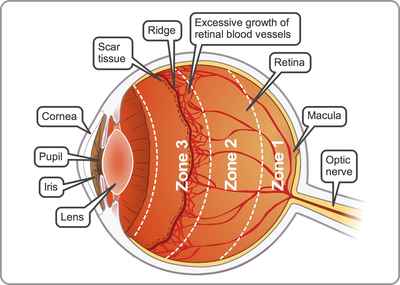Retinopathy of prematurity (ROP) is a vision-threatening eye disease that affects premature babies with very low birth weight (VLBW). The premature baby's retina and the retinal blood vessels did not complete their growth when the baby was born and abnormal blood vessels form in a premature baby's eye(s). The vessels can lead to bleeding and scarring. They may also cause retinal detachment, where the retina moves from its normal place in the eye.

Babies who are born before 31 weeks gestation and who weighs less than 1500g are at greatest risks of developing ROP.
Babies who have severe ROP are at risk of retinal detachment leading to blindness. Babies with regressed but severe ROP may develop visual problems such as squint, myopia and astigmatism later in childhood.
All babies born before 32 weeks of life will undergo screening by eye specialists. Other more mature premature babies may also be required to undergo the screening if their postnatal course is unstable.
















